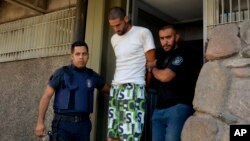Argentina's government, with one eye on elections later in the year, is getting tough on crime, and one figure is taking center stage: the country's security tsar.
Patricia Bullrich, 62, the security minister, is pushing a series of new tough-on-crime measures, including dropping the age for juvenile convictions, equipping cops with stun guns and trialing facial recognition at train stations.
In an interview, Bullrich told Reuters she was also spearheading talks with China to purchase police body cameras for local forces, which she added would be the first such deal with Beijing for her ministry.
"Insecurity is a concern of the Argentine people and so it's a concern of our government," she told Reuters at her sprawling Buenos Aires offices at the Ministry of National Security.
"We're trying to have the best tools.”
The focus on crime comes as her boss, President Mauricio Macri, prepares for national elections in October, with the country still reeling from an economic collapse last year that saw Argentina's peso lose half its value against the dollar.
Macri, hamstrung by a deal with the International Monetary Fund (IMF) that gives his government limited options to rev up a stalled economy, is trying to turn attention instead to security.
Mariel Fornoni, a political analyst for Argentinian consultancy Management and Fit, said the government was trying to pitch its campaign with "Bullrich front and center and a focus on the issue of law and order".
This, in part, is a way of distracting from the economic turmoil still roiling the country, Fornoni said.
"[The focus of the campaign] can't be centered around the economy," she said.
Gang crackdown
The security minister has often been at Macri's side over the past few months and regularly posts on social media about the latest drug bust or gang that has been taken down.
"Let's fight hard against the drug trafficking mafia and their impunity," she wrote on Twitter on Wednesday.
Bullrich was once part of a left-wing Peronist political faction with ties to guerrilla groups and was exiled under Argentina's military dictatorship that ruled in the 70s and 80s.
She is now the face of Argentina's crackdown on drugs and "narcoterrorism".
The security tsar, who some have tipped to take an even more central political role, told Reuters her past with a guerrilla group had steeled her to deal with tough political fights now.
She did not rule out a future run for higher office, but said she was now focused on the work at hand.
"In that moment, we were anti-system in every sense," she said, adding she'd since learned that while democracy was not perfect, "It's the best system we have.”
Bullrich is now pushing ahead some controversial laws, including the deportation of foreigners convicted of crimes and lowering the age of impunity by a year to 15, which she said was to deter young people from committing serious crimes.
Other measures include buying about 300 stun guns for police, the introduction of a law on violence by soccer fans and another easing rules around using DNA collected from criminals.
Political peers defended her crime crackdown as being a reflection of what citizens were concerned about.
"It is not opportunism," Eduardo Amadeo, deputy for the ruling Cambiemos party, said, adding security was a pressing domestic issue. "We must respond to the demands that have to do with the welfare of the people.”





